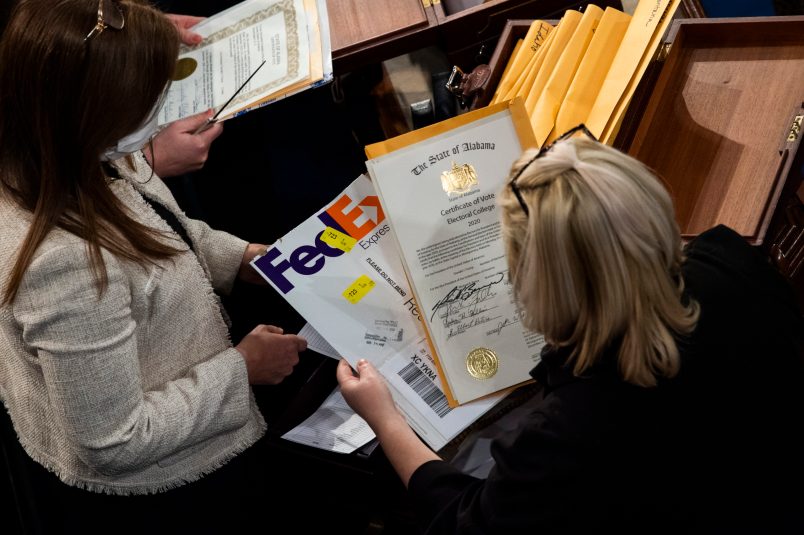Eighteen months after the Jan. 6 attack on Congress, a bipartisan group of senators released a proposal Wednesday to help prevent future election theft attempts, and pro-democracy groups and experts are rallying around the legislation.
Led by Sens. Susan Collins (R-ME) and Joe Manchin (D-WV), a negotiating group that includes eight other Republicans released a pair of bills that, among other steps, update the 135-year-old Electoral Count Act — the law Trump targeted to argue, falsely, that the vice president could discard states’ Electoral College votes. The proposal would specify that the vice president plays a “solely ministerial” role in counting Electoral College votes, that each state can only submit one slate of Electors to Congress, and that only one official per state can certify election results.
The bills would also raise the threshold for the number of members of Congress that it takes to lodge an objection to a states’ Electoral votes and, in doing so, delay the certification process. At the moment, just a single member of both chambers is needed to object. Under the proposed legislation, one fifth of the House and Senate would have to object. Further, the proposal eliminates a provision of an 1845 law that allows state legislatures to disregard the popular vote in the event of a “failed election.”
In the event of election disputes, under the legislation, a federal three-judge panel will hear the matter, with appeals going directly to the Supreme Court on an expedited basis.
“I think this very well could be the most important thing this Congress does, and for some of these senators, might be the most important thing they do in their career,” said Michael Thorning, director of governance at the Bipartisan Policy Center, during a panel discussion Thursday.
Other groups focused on election integrity offered similar praise.
“As the nation witnessed during the last presidential transition, our election system isn’t fully equipped to withstand partisan attempts to overturn presidential election results,” Genevieve Nadeau, counsel with the group Protect Democracy, said in a statement Wednesday.
“For that reason we are glad that senators filed legislation today that would fix many dangerous ambiguities in the antiquated Electoral Count Act of 1887.”
On the influential Election Law Blog, a group of law professors urged passage of the bill, calling it “a major improvement,” not least because of the significantly bipartisan nature of the group of senators behind it.
“If this bill is enacted and future Congresses are faithful to its philosophy when they meet in joint session to count electoral votes as required by the Twelfth Amendment, there should no longer be a threat of congressional efforts to negate the result of a state’s popular vote that has been determined in accordance with the rule of law,” they wrote.
Some acknowledged the bill as an important step, but also noted what it does not address, namely, state-level voter suppression efforts like onerous voter ID rules or limits to early voting. Democrats’ attempts to address such laws have been repeatedly shot down by Republicans.
Karen Hobert Flynn, president of Common Cause, said the proposal represented “significant bipartisan consensus on the need to address this issue,” but added that the package “does not fully address the threats to an inclusive and representative democracy,” such as racially discriminatory voting laws.
And, as comprehensive as the bipartisan bills unveiled Wednesday are, they have limits. A Wednesday Washington Post analysis — one that nonetheless deemed the proposal “surprisingly good” — posed such a scenario: “What if every actor in the system is corrupted? What if a state legislature and governor certify the wrong electors? What if a corrupted Congress wants to count those electors? And what if the federal courts — including the Supreme Court — bless those wrong electors as well?”
Adav Noti, vice president and legal director of the Campaign Legal Center, was blunt: “There’s not a whole lot you can put on paper that will stop that.”
But the bill would be a significant adjustment to current law, where a much smaller cohort can wreak havoc by taking advantage of the Electoral Count Act’s shortcomings.
Thorning, during Thursday’s panel, compared the effort to prevent election subversion to a mouse trap.
“Mice are very smart,” he said. “They figure out all kinds of ways around, through, in, out of every mouse trap on the market. And the point is to try to catch as many of them as you can. And that’s what I think this proposal is trying to do, it’s trying to catch as many of the situations where there’s an opportunity for mischief.”







Well, it’s a start.
And, more importantly, a clear acknowledgment of what FatAss and Co tried to do.
First! (ETA: Second!)
And, right: as I understand the proposed bill, it’ll deal with precisely the main issues that Trump’s enablers tried/argued in the courts and, almost, in the Senate.
I don’t understand the fetishization of the bill’s bipartisan underpinnings. Why does that make the bill better, to some folks? Just because it’s more likely to pass? It seems as though they want bipartisan bills simply so they can tout bipartisanship.
This sounds like a promising bill, and I hope it makes it through to Biden’s desk unscathed. But … Manchin and Collins? Really? I greatly fear that Collins will suddenly “have concerns” when the vote is called, and Manchin will change his vote to “Nay” because without dear Susan’s vote, the bill is no longer “bipartisan.”
And they will have snatched the football from all Americans yet again.
Off topic but news, missing SS messages now a criminal investigation. SS ordered to stop investigating itself. Lol. That one made me laugh.
Rawstory